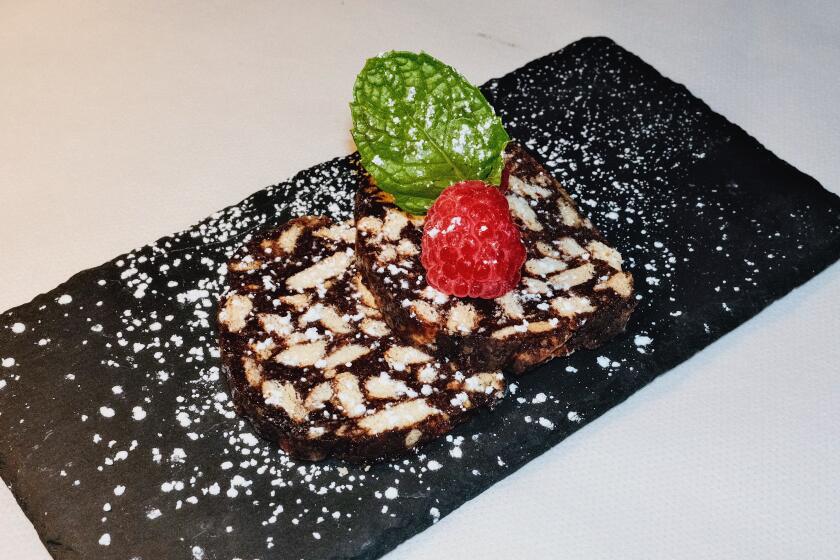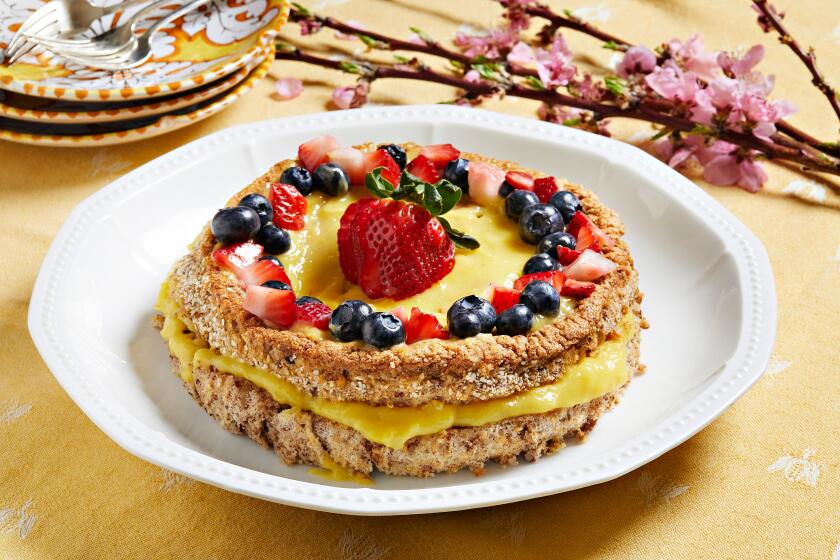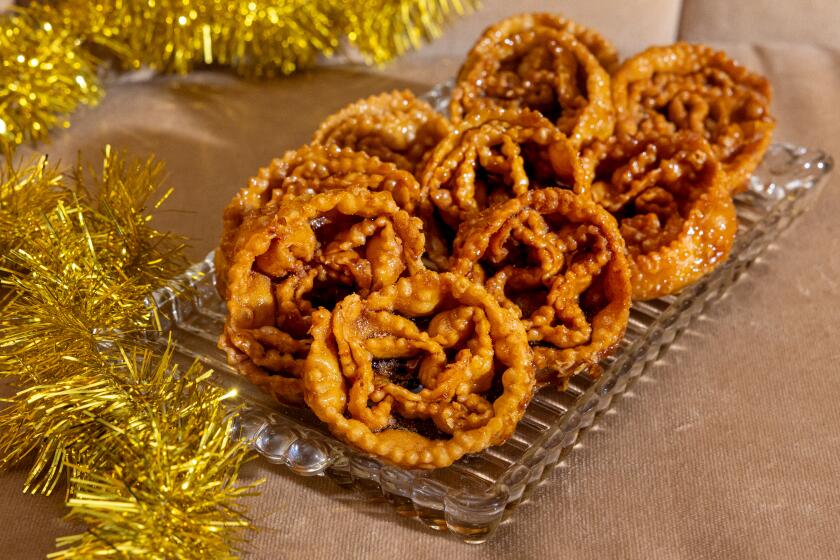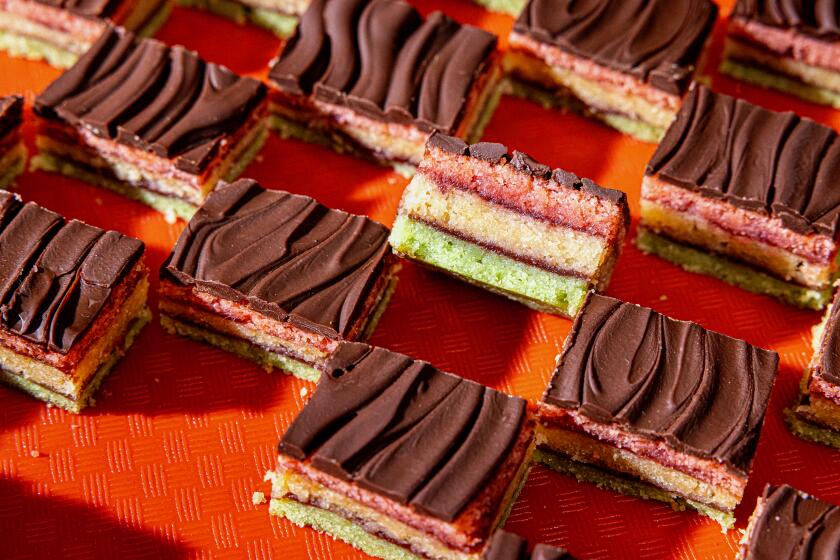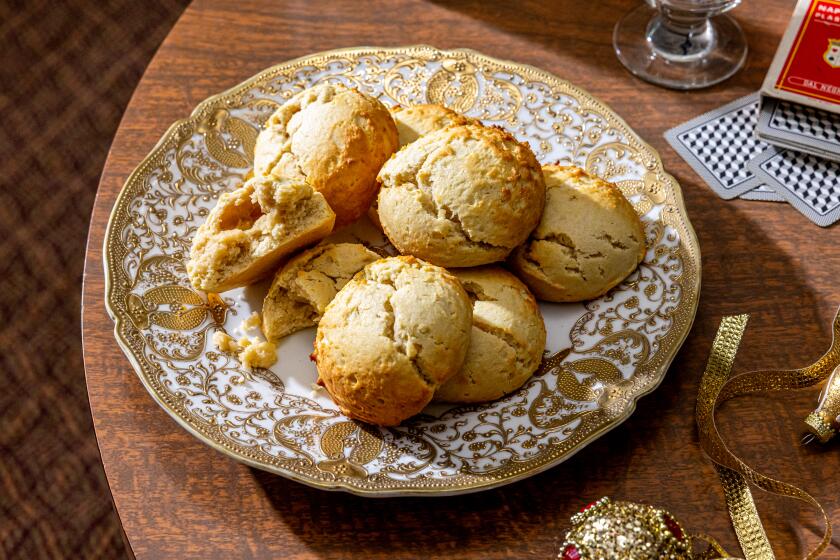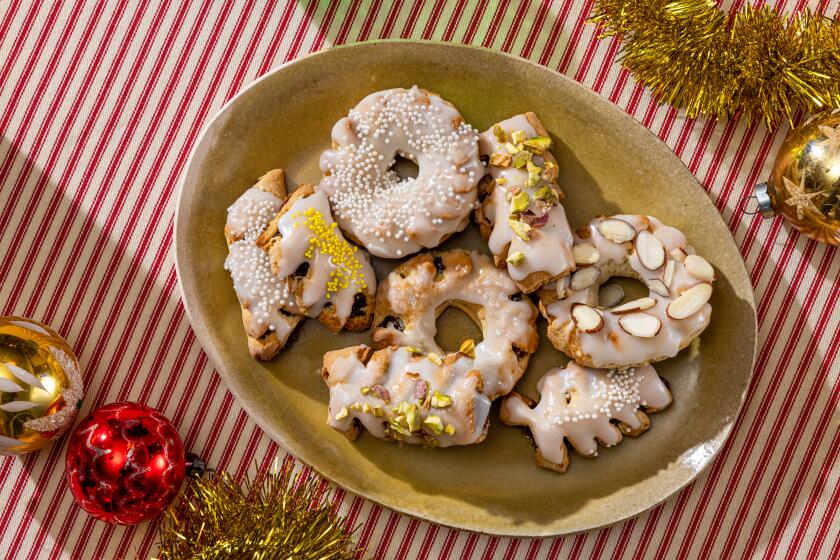Butter cookies
- Share via
By Thanksgiving weekend, the prep work was well underway. All year long she’d been saving the boxes from stationery and from her nylon stockings, stashed with the Christmas ornaments. She’d made lists in her perfectly inscrutable handwriting. In our basement refrigerator, she had squirreled away some of the raspberry jam she made during the summer.
So every fall, when my mom told us that she’d grown tired of the whole idea of Christmas cookies and was giving them up, she didn’t mean it. We were never sure, though. And we’d whine on cue, begging her to please at least make the kind we just couldn’t live without -- for me, the Russian tea cakes, for my brother, the spice cookies called pepparkakor.
But most of her work went on in secret, while we were at school or after we’d gone to bed.
And by Christmas Eve, we’d have maybe 100 dozen cookies, as many as 20 varieties of exquisite, painstakingly formed cookies, stored in our freezer.
As a small child, bringing out box after box of cookies that morning was kind of a miracle. Not quite as wonderful as Santa, who would get a plate of them that night, but part of the blur of a holiday full of magic and surprise.
Later, when I was a teenager, I knew they were there, noticed the boxes piling up, even poked my way inside a few boxes, though never daring to take any. (Don’t misunderstand; I got in plenty of teenage trouble, but that was a line I didn’t cross.)
Lots and lots of mothers bake Christmas cookies, I know. Actually, I know that now. When I was a child, I used to think my mother was the only one. But the truth is, I’m a lot older and a bit more worldly, and I know still that no one made more beautiful or more delicious Christmas cookies.
Russian tea cakes may be everywhere, but they were never more perfect. You can buy frosted butter cookies even at the supermarket, but my mother’s were a delicate one-sixteenth of an inch thick, the icing just a glaze, the decorations minimal, angelic almost.
She never made any of those cookies the rest of the year.
I don’t know how or why she started baking them; it never occurred to me to ask. As far as I know, her mother didn’t make them; she wasn’t the type for delicate anyway.
But I know why they were perfect: My mom was a college-educated housewife who in another time might have been a naturalist or a historian. So when she took on a project -- growing African violets or studying the Civil War era or making Christmas cookies -- she conquered it every bit as ambitiously as other people climbed career ladders.
Ann MacVean’s Christmas cookies were anticipated not just by the MacVean children, but by anyone in Middletown, N.Y., lucky enough to get them.
My younger sister, Kathryn, remembers someone saying, “It wasn’t Christmas until the MacVeans put up the soldiers [part of my father’s holiday decorations] and you got their cookies!”
--
On cookie duty
Early on Christmas Eve morning, we kids would be sent to the basement to carry up the many boxes of cookies. We were supposed to make sure we’d included every kind, and my mother would sometimes forget how many varieties she’d made. There were the standards: butter cookies, Russian tea cakes, little nut sandwich cookies, nutmeg logs, shortbread colored and decorated to look like slices of lemon or orange, chocolate heart-shaped cookies. And every year some new ones.
We were on duty all morning -- no matter that it was school vacation, or that it might have snowed. We were expected in the kitchen, hands washed, ready to decorate the butter cookies and the pepparkakor.
Whatever was she thinking? We made an unholy mess every year, not to mention all the cookies that “accidentally” broke so we’d have to eat them, and the icing glaze that had to be made over and over when we spilled colored sugars into the bowls. Or the battles we’d have over which of us (always my brothers -- certainly never me!) was making ugly cookies that would bring shame to us all if they went onto gift trays.
“Remember those horrible silver balls we used as decorations?” my sister asked.
Yes, I do. And I remember the “red hot” cinnamon candies. And mom chiding us for not following her example of the slightest of sprinkling of sugars, just enough to suggest color. These were tiny cookies, with a style the polar opposite of those $4 decorator cookies sold today.
My brothers, Mac and Jamie, would revel in hideous cookies, mixing sugar to make a grayish purple, piling on every sort of fancy candies. Jamie once got Mom to bake a large butter cookie to look like a guy carrying a boom box on his shoulder. My sister and I were horrified that that cookie was preserved and became a tree ornament -- but learned that humor and joy sometimes mattered more than Mom’s exacting baking standards.
Once the dozens and dozens of decorated cookies had been placed on racks to dry, our next job began.
We made up trays of cookies -- a dozen or so -- to be given as gifts. That chore also had its rituals: Mom would complain that we were not being generous enough, and we’d complain that there would not be enough cookies left for us.
Kathryn recently owned up in an e-mail to something I always suspected: “I would pack lots of the ones I didn’t like (which just happened to be the ones you did like!!) and hardly any of the ones I did like.”
--
Delivery day
Dad worked half a day on Christmas Eve, and we were usually just finishing the gifts, wrapped abundantly with Saran wrap and tied with ribbons and tagged. Big families got more than small families.
And after lunch, we’d carefully carry the trays down the slippery walk to the station wagon, and spend most of the afternoon driving from house to house: the Smileys, an old couple full of joy and humor; the family that had lost its dad; Marie Skinner, Dad’s secretary, and her sister Grace -- women who once were called “spinsters”; and other friends, as well as people my mom thought “needed” cookies.
Mom stayed home. With hindsight, I imagine she was wrapping gifts. But then, we never understood why she didn’t want to get all those compliments. She always acted like the people getting the cookies were doing her a favor by eating them.
As a kid, I thought those cookies made our family seem like big shots. I saw what passed for homemade cookies in my friends’ houses. Nobody could touch my mother’s cookies. I knew that and I loved it.
Kathryn loves the cookies every bit as much as I do. But she saw things a little differently when she was little.
She says she used to wonder if we were poor, like the Waltons, stuck giving cookies as Christmas gifts. Especially when our dad would come home from work many evenings around Christmas with a bottle of liquor in each arm, gifts he’d gotten from clients (Scotch if the people actually knew him).
My mom died last fall, and although she had been disabled by strokes and hadn’t baked for several years, her death makes the loss of that tradition more acute, even though my sister and I both bake her cookies in our own homes. But poor we were not: Those cookies -- or more particularly, the rituals around them -- made us rich beyond imagining.
Cookie
In the bowl of a stand mixer, or in a large bowl using an electric mixer, cream together the butter and sugar. Beat in the egg until combined.
Stir in the vanilla, then the baking powder. Slowly stir in the flour until combined. Wrap the dough tightly in plastic wrap and refrigerate until well-chilled, at least 2 hours.
Heat the oven to 425 degrees. Roll out the dough on a lightly floured surface about one-eighth inch thick. Cut the dough into desired shapes. Place the cookies approximately 1 inch apart on an ungreased baking sheet.
Bake the cookies in the center of the oven until set, about 5 to 7 minutes (they should not color and may only be faintly golden around the edges). Remove and cool the cookies on a rack. Frost the cookies (below) when cooled, or cover tightly and freeze until ready to frost, up to 2 months; thaw before frosting.
Glaze and final assembly
In a medium bowl, whisk together the powdered sugar and milk to form a glaze. Frost the cookies with a thin coating of the glaze, then decorate as desired.
Get our Cooking newsletter.
Your roundup of inspiring recipes and kitchen tricks.
You may occasionally receive promotional content from the Los Angeles Times.










